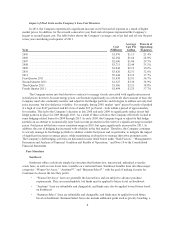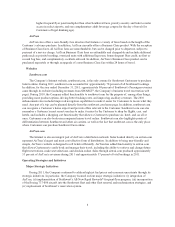Southwest Airlines 2011 Annual Report Download - page 20
Download and view the complete annual report
Please find page 20 of the 2011 Southwest Airlines annual report below. You can navigate through the pages in the report by either clicking on the pages listed below, or by using the keyword search tool below to find specific information within the annual report.To provide passenger transportation in the United States, a domestic airline is required to hold a Certificate
of Public Convenience and Necessity issued by the DOT. A certificate is unlimited in duration, and the
Company’s certificate generally permits it to operate among any points within the United States and its territories
and possessions. Additional DOT authority, in the form of a certificate or exemption from certificate
requirements, is required for a U.S. airline to serve foreign destinations either with its own aircraft or via
codesharing with another airline. The DOT also has jurisdiction over international tariffs and pricing in certain
markets. The DOT may revoke a certificate or exemption, in whole or in part, for intentional failure to comply
with federal aviation statutes, regulations, orders, or the terms of the certificate itself.
The DOT’s consumer protection and enforcement activities relate to areas such as unfair and deceptive
practices and unfair competition by air carriers, deceptive airline advertising (e.g., fare, on-time performance,
schedule, and codesharing), and violations of rules concerning denied boarding compensation, ticket refunds, and
baggage liability requirements. The DOT is also charged with prohibiting discrimination by airlines and focuses
on ensuring that individuals with disabilities obtain nondiscriminatory access to the air transportation system and
that the public is not subjected to unlawful discrimination by airlines on the basis of race, religion, national
origin, or sex during the course of their air transportation.
Airlines are also subject to a DOT consumer protection rule (the “Passenger Protection Rule”), which
addresses, among other matters, tarmac delays and chronically delayed flights (i.e., flights that operate at least 10
times a month and arrive more than 30 minutes late more than 50 percent of the time during that month). Under
the Passenger Protection Rule, U.S. passenger airlines are required to adopt contingency plans that include the
following: (i) the assurance that no domestic flight will remain on the airport tarmac for more than three hours
unless the pilot-in-command determines there is a safety-related or security-related impediment to deplaning
passengers or air traffic control advises the pilot-in-command that returning to the gate or permitting passengers
to disembark elsewhere would significantly disrupt airport operations; (ii) the assurance that air carriers will
provide adequate food and potable drinking water no later than two hours after the aircraft leaves the gate (in the
case of departure) or touches down (in the case of arrival) if the aircraft remains on the tarmac, unless the
pilot-in-command determines that safety or security considerations preclude such service; and (iii) the assurance
of operable lavatories, as well as adequate medical attention, if needed. Air carriers are required to publish their
contingency plans on their websites.
The Passenger Protection Rule also subjects airlines to potential DOT enforcement action for unfair and
deceptive practices in the event of chronically delayed flights. Airlines are required to (i) display ontime
performance on their websites; (ii) adopt customer service plans, publish those plans on their website, and audit
their own compliance with their plans; (iii) designate an employee to monitor the performance of their flights;
and (iv) provide information to passengers on how to file complaints and respond in a timely and substantive
fashion to consumer complaints. Airlines that violate the Passenger Protection Rule are subject to potential fines
of up to $27,500 per passenger, the maximum allowed for violating any aviation consumer rule. The DOT has
expressed its intent to aggressively investigate alleged violations of the Passenger Protection Rule.
In August 2011, the DOT implemented new rules expanding the Passenger Protection Rule by, among
other things, (i) increasing the maximum denied boarding compensation airlines must pay to passengers bumped
from flights from $800 to $1,300; (ii) requiring airlines to refund any checked bag fee for permanently lost
luggage; (iii) requiring airlines to prominently disclose all potential fees for optional services on their websites;
and (iv) requiring airlines to refund passenger fees paid for ancillary services if a flight cancels or oversells and a
passenger is unable to take advantage of such services.
Effective January 2012, the DOT further expanded the Passenger Protection Rule by implementing a new
airfare advertising rule (the “full-fare advertising rule”) that require all advertised airfares to include government-
mandated taxes and fees, including fuel charges and security fees. Other new and expanded components of the
Passenger Protection Rule require, among other things, that: (i) passengers be allowed to hold a reservation for
up to 24 hours without making a payment; (ii) passengers be allowed to cancel a paid reservation without penalty
for 24 hours after the reservation is made, as long as the reservation is made at least seven days in advance of
14
























